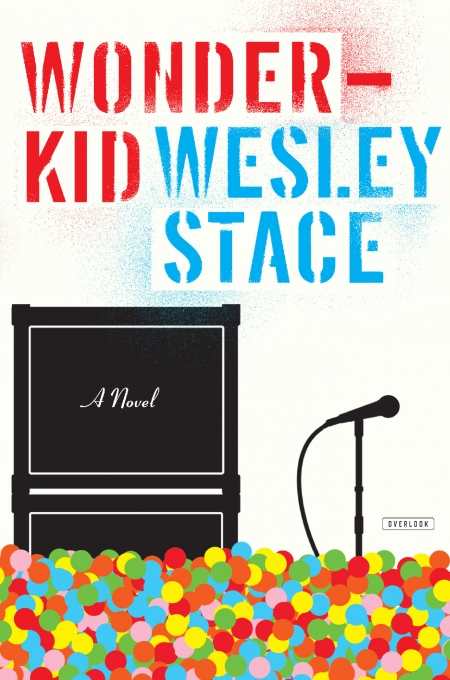
Wonderkid
Musician and author Wesley Stace brings rock and roll alive with exquisitely authentic details in this funny novel about a rock band for kids.
Welcome to the rock-and-roll Romper Room, where juice boxes vastly outnumber Solo cups. That’s the view from the stage, as road-tested musician Wesley Stace paints it in Wonderkid, a perfectly pitched coming-of-age novel that’s as playful and provocative as rock music itself. Here you’ll meet nascent band the Wonderkids as they take America’s under-ten set by storm and learn a few adult lessons along the way.
Equally ironic and innocent, lead singer Blake Lear brings a band of musical misfits from Britain to America at a time when Baby Boomers want something a little less Raffi and a little more Ramones on their children’s playlists. That’s something the Wonderkids can provide. Stace expertly sets the scene: a tour bus full of imagination and angst, as seen through the eyes of Blake’s protégé, his adopted son, Ed Sweet. Never mind that Sweet, as he is called, is barely ten years Blake’s junior. The absurdity of the parent-child arrangement captures Blake’s cavalier attitude toward established rules.
Stace brings the road alive with exquisitely authentic details. He knows what he’s talking about: while Stace is an accomplished author, he’s perhaps better known for his years as a recording artist, under the name John Wesley Harding. He’s been where Blake and Sweet are, and it feels like you’ve just stepped onto the bus yourself when you encounter bass player “Mum” doing yoga in the corner while Blake recites Lewis Carroll from the couch, and his brother Jack records the whole thing on his video camera.
The concert scenes are equally convincing, and hilarious, as Stace delights in the ironies of rock and roll delivered to toddlers and breastfeeding mothers. Even as you fear that Blake will take things too far for his audience, you also hope he will. It’s not far from peanut butter and feathers to biting the heads off bats, and you’re never sure where he will draw the line.
Banter at its best keeps the pace up even as the band slogs through their inevitable evolution from Top Ten kiddie rock band to a gathering of disaffected artists who all want to do their own thing. The characters are flawed, funny, affectionate, and angry at turns, which Stace shows through dialogue. “Can you get me a pig’s head?” Blake asks road manager Mitchell, acting on a whim, as always. Level-headed Mitchell coolly replies, “No, I cannot get you a pig’s head.” The voice of reason speaks. Plenty of the action is distilled by Sweet, who quietly ponders each of these “grown-ups,” but the brightest moments are when they simply talk to each other and you find yourself smiling in recognition.
The familiarity is entirely engaging, and it’s likely that you’ll worry about the band’s trajectory, the looming loss of innocence, and probably the fate of rock music. Stace doesn’t take things in the usual direction, though, so don’t give up on these guys. In the end, they prove that the spirit of rock and roll might grow up a bit, but, indeed, it never dies.
Reviewed by
Sheila M. Trask
Disclosure: This article is not an endorsement, but a review. The publisher of this book provided free copies of the book to have their book reviewed by a professional reviewer. No fee was paid by the publisher for this review. Foreword Reviews only recommends books that we love. Foreword Magazine, Inc. is disclosing this in accordance with the Federal Trade Commission’s 16 CFR, Part 255.
